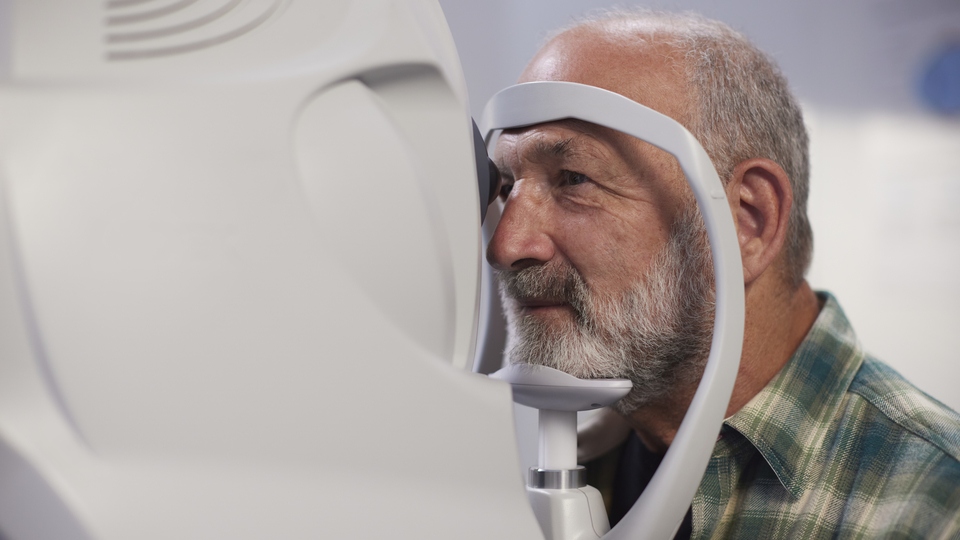Glaucoma: The silent thief of sight
Date published: 27 June 2022

This Glaucoma Awareness Week (June 27 - July 3) Specsavers, together with the charity Glaucoma UK, is raising awareness of what to look out for as well as the importance of regular eye tests
Experts are urging people to have regular eye checks to help protect them from glaucoma - one of the leading causes of blindness in the world.
Research shows that between 2015 and 2035 the number of people living with glaucoma in the UK is expected to increase by 44%.
However, due to its gradual onset, many people don’t realise they have the condition before it is too late.
That is why this Glaucoma Awareness Week (June 27 - July 3) Specsavers, together with the charity Glaucoma UK, is raising awareness of what to look out for as well as the importance of regular eye tests.
What is glaucoma?
Giles Edmonds, Specsavers clinical services director, said: "Glaucoma is a common eye condition where the optic nerve, which connects the eye to the brain, becomes damaged.
"It's usually caused by fluid building up in the front part of the eye, which increases pressure inside the eye.
"Glaucoma can lead to loss of vision if it's not diagnosed and treated early.
"But, although any vision which has been lost to glaucoma cannot be recovered, with early diagnosis, careful monitoring and regular treatment, most people retain useful sight for life."
Are there any warning signs?
Mr Edmonds said: "There are two types of glaucoma.
"Chronic glaucoma and acute glaucoma.
"With chronic glaucoma, the visual loss can initially be very subtle and occurs just beyond your central vision, progressing slowly inwards towards your central vision and outwards into the periphery.
"Most patients will not be aware of this visual loss due to the way the eyes visual fields overlap, compensating for one another.
"The way this is detected by your optometrist is through the use of a visual field test.
"During this test you will be shown a sequence of light spots and asked which ones you can see.
"Any very subtle blind spots, which you will probably be unaware of, can be an indicator of the condition.
"However, acute glaucoma is often sudden and painful and may present with other symptoms including blurred vision and haloes around lights.
"At Specsavers, we also benefit from having advanced diagnostic equipment called OCT (Optical Coherence Tomography) that enables us to look at the eye in more detail than ever before and spot the early signs of many sight loss conditions."
What are the risk factors?
Family history - The most common type of glaucoma, primary open-angle glaucoma, is hereditary.
If members of your immediate family have glaucoma, you are at a much higher risk than the rest of the population – in fact family history increases risk of glaucoma by up to four times.
Age - Glaucoma becomes more common with age.
The risk of getting it rises from about two in 100 over the age of 40 to more than one in 20 for those aged 80+.
Blood pressure – While very high blood pressure can lead to an increase in intraocular pressure, low blood pressure can lead to insufficient blood supply to the optic nerve which can also cause problems.
Ethnicity - People of African-Caribbean and east Asian origin have a higher risk of glaucoma compared to those of European origin.
How is it managed?
For many years, eye drops have been the most common form of treatment for glaucoma.
They are used to decrease the amount of fluid in the eye, either by increasing the drainage of fluid out of the eye, or by reducing the amount of fluid that is made.
However, other options such as surgery and laser treatment are available.
Joanne Creighton, Chief Executive at Glaucoma UK, added: ‘Glaucoma can be symptomless, so you may not know you have it.
"That’s why it’s vital that people have their eyes checked every two years, even if they are not experiencing any problems with their sight.
"The earlier glaucoma is diagnosed, the sooner it can be managed so that any further sight loss can be prevented.
"Being diagnosed with glaucoma can be scary, but you are not alone – Glaucoma UK is here to help.
"We provide advice and guidance to anyone living with the disease in the UK, and their loved ones.
"For more information, please visit our website: glaucoma.uk"
For more information or to book an appointment visit: www.specsavers.co.uk
Do you have a story for us? Want to tell us about something going on in and around Oldham? Let us know by emailing news@oldham-chronicle.co.uk , calling our Oldham-based newsroom on 0161 633 2121 , tweeting us @oldhamchronicle or messaging us through our Facebook page. All contact will be treated in confidence.
Most Viewed News Stories
- 1Family pay tribute to 'true gentleman' who was murdered following reported fight close to Elk Mill...
- 2Murder charge secured following incident near Elk Mill roundabout earlier this week
- 3Police investigate 'shocking' stabbing incident at Oldham retail park
- 4Oldham Temple spreads joy at Holi Festival with rainbow of colours.
- 5Oldham's 'deafening silence' since voting to leave Places for Everyone scheme




